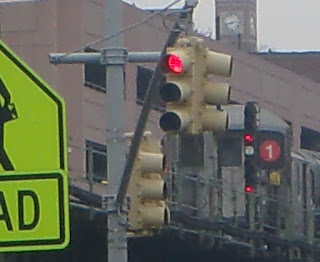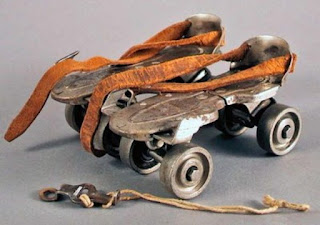Saturday, February 25, 2023
Goodbye, Mr. Chips
Wednesday, February 22, 2023
The Ice Cream Man Cometh
In New York City and much of the northeast, residents like me are experiencing the winter that wasn’t and apparently won’t be. It’s been so mild and virtually snowless that the ice cream man, Mister Softee, is already making his appointed rounds. This is unheard of for this time of year, akin to the swallows of San Juan Capistrano returning on St. Lucy’s Day rather than St. Joseph’s Day. Rounds, by the way, that include the venerable Mister Softee jingle polluting the air. As a youth, I welcomed the ditty playing over and over and over on a repetitive loop—and why not? Now, however, it’s intrusive and maddening! With ample history on my side, I reasoned that I was safe in wintertime from this very grating sound of summer. To employ a favorite media tag: It is truly “historic.”
These are, in fact, times that try men’s souls on a whole host of fronts. For instance, the latest ignominy perpetuated on the written word: the bowdlerizing of children’s author Roald Dahl’s works. I never read any of his stuff as a boy, but the late author had and has a considerable following. Over three million copies of Dahl’s books have sold. His characters are peculiar and colorful: “fat,” “ugly,” and “crazy” for starters.
In Dahl’s original James and the Giant Peach, published
in 1961, the Centipede character sings: “Aunt Sponge was terrifically fat…and tremendously
flabby at that” and “Aunt Spiker was thin as a wire…and dry as a bone, only
drier.” Here are the edits made sixty-two years later that the publisher,
Puffin, says are “small and carefully considered”: “Aunt Sponge was a nasty
old brute…and deserved to be squashed by the fruit” and “Aunt Spiker was much
of the same…and deserves half of the blame.” That’s small and carefully
considered!
In Dahl’s 1983 book “The Witches,” he writes at some point, “Even if she is working as a cashier in a supermarket or typing letters for a businessman…” This is changed in 2023 to “Even if she is working as a top scientist or running a business…” I believe young and old alike can ascertain how books from the past—some written eons ago—reflect their time and don’t require alterations to avoid offending someone somewhere in the here and now. By the way, what’s the issue with working as a cashier? Elite censors?
When I imagine who these censors are—predominantly young flunkies in publishing taking their marching orders from consultants—I cringe. This offended class—non-writers educated in the art of offense—willy nilly rewriting the books of a renowned and deceased author—with a large fan base that transcends generations—is at once out of line and nauseating. Sure, Dahl was a strange man and “not an angel” to quote Salman Rushdie, harsh critic of this farce. But Dahl—and Dahl alone—created the surreal world with the likes of Augustus Gloop, Matilda Wormwood,, and George Kranky inhabiting it. It’s not the job of present-day puerile blue-pencil pushers and wacky activists to obliterate it. Here’s an idea: Why not cultivate new writers instead? Folks who will envision characters who aren’t fat, ugly, and crazy, but non-binary, neurodiverse, and intersectional instead. The more the merrier! And while you’re at it: Fear not all that came before, it won’t bite you.
I’ve dealt with many fine editors through the years. More than a few copyeditors, though. remained anonymous and I had no say at the changes made to my manuscript. I never got to pore over the final draft. Work-for-hire jobs. Favorite edit from Knack: Night Sky: I referred to the “near side of the Moon.” A mystery editor, who evidently didn’t know that there are—in the common parlance—a “near side” and “far side” of the Moon, changed “near side” to “near the side.” It’s not quite the same thing, is it?
Tuesday, February 21, 2023
Boom Goes the Dynamints
Sunday, February 19, 2023
The Midwinter Recess Lives
Wednesday, February 15, 2023
Sunbeam Energy
Recently, old family slides were made into pictures. Since slide shows were a thing of the past, these images had rarely been seen for decades. Our family slide taking occurred in the mid-1970s through the early 1980s—and then that was the end of that. In the slide mix were some visuals of visits to my maternal grandparents, who lived in a town called Bangor, on a street called Miller, in the Keystone state of Pennsylvania. For kids from the Bronx, visiting Bangor and Miller Street was akin to entering The Twilight Zone. It was another world altogether and—after Route 80 was completed—only an hour and a half drive due west from New York City.
I was taken with one particular, not-especially-clear slide from Bangor—on Miller Street during our bicentennial year—that featured a certain truck in the backdrop. Miller Street was a very steep hill, with my grandparents sandwiched somewhere in the middle of it, and on the block below them was a frequently parked Sunbeam Bread truck. My grandmother used the product all the time and, as I recall, Sunbeam was pretty tasty as bland sliced white breads went. But only now—all these years later—have I given this image its proper due.
Somebody on Miller Street obviously owned a Sunbeam Bread truck route, because the truck was usually there during the day. I suspect he delivered the bread in the wee hours of the morning to area stores, and was back on Miller Street by early afternoon. I believe Sunbeam Bread was available everywhere, including the Bronx, but I don’t ever remember having it at home, and so I always associate it with my grandmother, Bangor, Miller Street, and that mysterious blue and yellow truck parked on the hill. I’m happy to report, too, that Sunbeam Bread lives on in grocery stores everywhere.
(Photo from the personal collection of Nicholas Nigro)
Jimmy's Roller Skates
Anyway, one thing led to another and I Googled “old roller skates,” or some such thing, and cast my eyes upon an image of an old pair of roller skates, the utilitarian metal kind that were, once upon a time, the rage. They sported leather straps that secured them to roller skaters’ feet. As I recall, the straps were sometimes spray-painted red, yellow, or black. The cheap paint jobs, though, invariably chipped away, revealing both the age of the roller skates and the amount of mileage on them. I would be remiss here if I didn't mention these vintage roller skates' keys—indispensable keys—that tightened adjustable clamps. Tightened them— flush at the soles of feet—to roller skaters’ footwear. They weren't one-size-fits-all, but more like one size fits several size shoes.
While these old-time roller skates were still around when I was a very young boy, more modern and stylish boot-like renditions were fast casting asunder these relics—keys and all—from the past. Nevertheless, when I spied a photo of these charming metallic dinosaurs with wheels, I remembered the only pair I ever owned. I didn’t do much roller skating in my youth. (While hockey on roller skates was popular on the area’s ample asphalt and concrete, it just wasn’t my thing.) Originally, my roller skates belonged to an older kid named Jimmy, who lived just around the block from me. When Jimmy outgrew them, his mother gave them to my mother to give to one of her boys, which turned out to be me. I was six or seven, and Jimmy might very well have been five, seven, or even ten years older than me, when the roller skates changed hands. Actually, I have no personal memories of Jimmy at all. I only recall that he was “mentally retarded,” which was the commonly used and accepted term back in the 1960s and 1970s. It wasn’t pejorative, although it sometimes became so depending on the circumstances. In fact, the term was then medically sanctioned, considered largely benign, and a vast improvement over prior callous monikers.
I remember I was hesitant to even put the roller skates on because they once belonged to Jimmy. I thought he had some sort of communicable disease, I guess. As I warily surveyed the raggedy, peeling yellow leather straps on this very old pair of roller skates, I figured I might enter the Twilight Zone, or some such thing, if I put them on—that I would become a “mentally retarded” person like Jimmy.
Funny, but while I recall Jimmy’s roller skates becoming my own for one brief shining moment in the late 1960s, I don’t—as I previously noted—ever remember encountering him, although I must have. I don't recall anybody saying anything negative about him to frighten me into avoiding his skates like the plague. That was just it—the long and short of it. Very few people back then spoke openly about people like Jimmy and what could be done to truly help the “mentally retarded.” We kids were thus left to fill in the blanks and imagine all sorts of things—like catching “mental retardation” from a pair of skates.
Wednesday, February 8, 2023
What's My Line?
When life gives you the coronavirus, get on the Wendy's drive-thru line. Some things transcend all.
Get it while you can.































